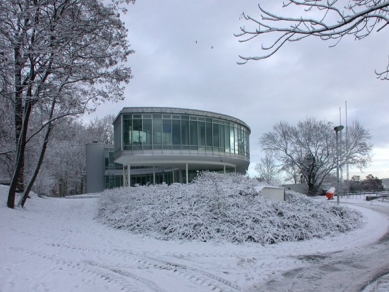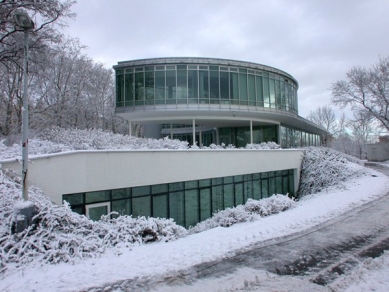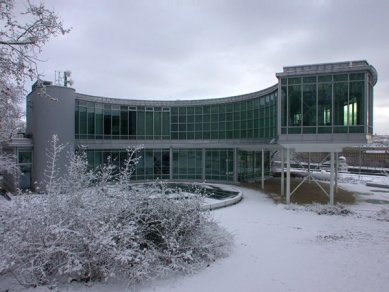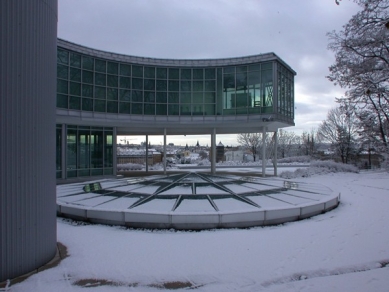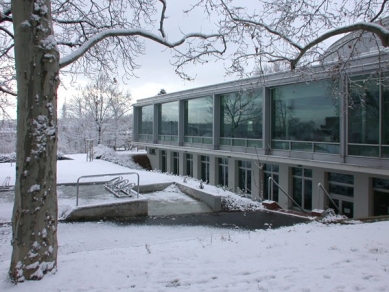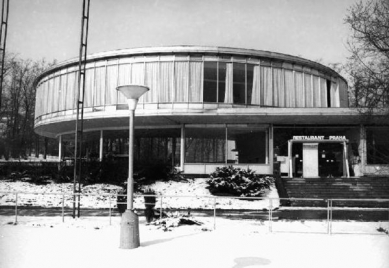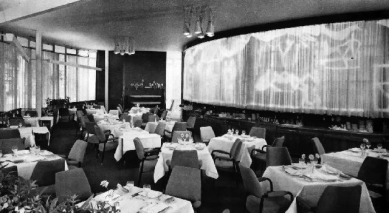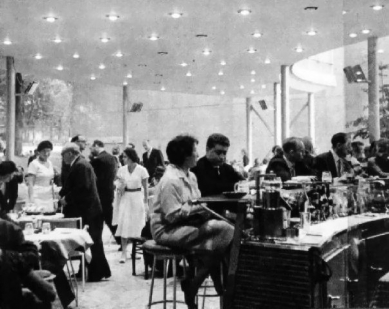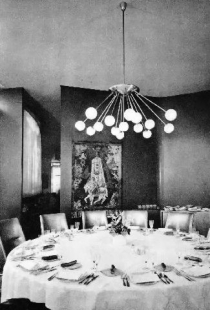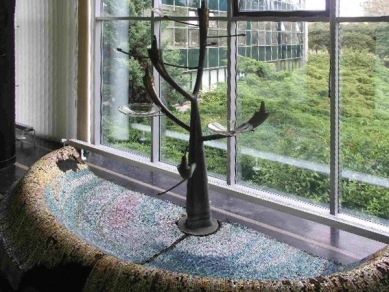
Expo 58 - restaurant Prague

1956 - In the summer, a limited architectural competition for the pavilion project was announced, which was won by architects Cubr - Hrubý - Pokorný from the State Project Institute for the Construction of Towns and Villages in Prague.
1958 - The Czechoslovak participation at the World Expo in Brussels was of fundamental significance - our country returned to civilized Europe.
1959 - The Czechoslovak government decided that both structures in Brussels should be dismantled and relocated to Prague - the pavilion was reassembled in the exhibition area in Královská obora, and the restaurant at the edge of Letenské sady.
1960-90 - It served as a restaurant, but was hardly significantly renovated for almost the entire duration.
1990-97 - The restaurant became a subject of post-privatization speculation, was not utilized, and nearly fell into disrepair.
1997 - The restaurant was acquired by A.I.V. and reconstruction began.
2000-01 - The Ministry of Culture decided on the objections from preservationists against the reconstruction. Preservationists objected that the project would only maintain the external appearance of the building while completely changing its internal layout. A fundamental decision came already at the time the reconstruction work was being completed.
2001-15 - After reconstruction, it served as the headquarters of the advertising agency Euro RSCG.
The Czechoslovak exhibition at the World Expo in Brussels in 1958 won an exceptionally and unexpectedly high prize, the "Golden Star", as well as thirteen other significant awards, in the overall evaluation of the international competition. The highest award was granted based on the high evaluation not only of the new techniques used in the construction of the demountable pavilions (steel frame) in combination with glass and plastic materials, but also for the perfect interior composed of original furniture, artworks, and utility items. Czechoslovak architects at Expem 58 showed the world that after the ideological interventions of the 1950s, that is, after the imposed socialist realism, they were able to connect with the global level of interwar Czechoslovak architecture.
Given this extraordinary success, it was decided to transfer the buildings of this exhibition to Prague. The exhibition pavilion and the stand of the Kaplan turbine were rebuilt at the Prague Exhibition Grounds, the Pilsen restaurant in Letenské sady in Prague, and Makovský's sculpture New Age in front of the gate of Brno Trade Fairs. In the autumn of 1991, the exhibition pavilion burned down and was later completely demolished. The Pilsen restaurant in Letná transformed into the offices of an advertising agency, leaving only the Kaplan turbine stand and the New Age sculpture as remnants of the entire success of the Czechs at Expo'58.
ČTK, 2001 - The Ministry for Regional Development confirmed the validity of the building decision on the reconstruction of the Expo 58 restaurant into offices. With this decision, against which there is no further appeal, it ended the long-standing disputes about the legality and correctness of building modifications to a significant monument, which is registered along with the center of Prague on the list of UNESCO World Heritage sites.
"We welcome this decision and are glad that the whole matter has been definitively resolved. If we had insisted that there would be a restaurant there, the place of the restored monument would still be a ruin," said Prague 7 mayor Tomáš Dub to journalists.
Minister of Culture Pavel Dostál canceled the decision of the municipal preservationists last May, who agreed to the reconstruction of the building for administrative use. However, the investor and owner of the property, A.I.V., had already completed the reconstruction and obtained a certificate of occupancy. Last autumn, it was handed over to a new tenant, and Expo 58 is set to serve as the headquarters of an advertising agency until 2015.
Mainly due to the initiative of Senator Václav Fischer's office, last year the municipal construction department challenged the building permit issued by the construction department of Prague 7. It argued that if the preservationists' permit is canceled, the building permit should also be revoked. However, the builder appealed to the Ministry for Regional Development and succeeded.
The Expo 58 restaurant, authored by František Cubr, Josef Hrubý, and Zdeněk Pokorný, was part of the Czechoslovak exhibition pavilion at the World Expo Expo 58 in Brussels. The restaurant was auctioned off during a small privatization, changed owners several times, and deteriorated very quickly. The current owner acquired the facility in 1997. According to earlier statements from A.I.V., the modifications for Expo cost 60 million crowns.
1958 - The Czechoslovak participation at the World Expo in Brussels was of fundamental significance - our country returned to civilized Europe.
1959 - The Czechoslovak government decided that both structures in Brussels should be dismantled and relocated to Prague - the pavilion was reassembled in the exhibition area in Královská obora, and the restaurant at the edge of Letenské sady.
1960-90 - It served as a restaurant, but was hardly significantly renovated for almost the entire duration.
1990-97 - The restaurant became a subject of post-privatization speculation, was not utilized, and nearly fell into disrepair.
1997 - The restaurant was acquired by A.I.V. and reconstruction began.
2000-01 - The Ministry of Culture decided on the objections from preservationists against the reconstruction. Preservationists objected that the project would only maintain the external appearance of the building while completely changing its internal layout. A fundamental decision came already at the time the reconstruction work was being completed.
2001-15 - After reconstruction, it served as the headquarters of the advertising agency Euro RSCG.
The Czechoslovak exhibition at the World Expo in Brussels in 1958 won an exceptionally and unexpectedly high prize, the "Golden Star", as well as thirteen other significant awards, in the overall evaluation of the international competition. The highest award was granted based on the high evaluation not only of the new techniques used in the construction of the demountable pavilions (steel frame) in combination with glass and plastic materials, but also for the perfect interior composed of original furniture, artworks, and utility items. Czechoslovak architects at Expem 58 showed the world that after the ideological interventions of the 1950s, that is, after the imposed socialist realism, they were able to connect with the global level of interwar Czechoslovak architecture.
Given this extraordinary success, it was decided to transfer the buildings of this exhibition to Prague. The exhibition pavilion and the stand of the Kaplan turbine were rebuilt at the Prague Exhibition Grounds, the Pilsen restaurant in Letenské sady in Prague, and Makovský's sculpture New Age in front of the gate of Brno Trade Fairs. In the autumn of 1991, the exhibition pavilion burned down and was later completely demolished. The Pilsen restaurant in Letná transformed into the offices of an advertising agency, leaving only the Kaplan turbine stand and the New Age sculpture as remnants of the entire success of the Czechs at Expo'58.
ČTK, 2001 - The Ministry for Regional Development confirmed the validity of the building decision on the reconstruction of the Expo 58 restaurant into offices. With this decision, against which there is no further appeal, it ended the long-standing disputes about the legality and correctness of building modifications to a significant monument, which is registered along with the center of Prague on the list of UNESCO World Heritage sites.
"We welcome this decision and are glad that the whole matter has been definitively resolved. If we had insisted that there would be a restaurant there, the place of the restored monument would still be a ruin," said Prague 7 mayor Tomáš Dub to journalists.
Minister of Culture Pavel Dostál canceled the decision of the municipal preservationists last May, who agreed to the reconstruction of the building for administrative use. However, the investor and owner of the property, A.I.V., had already completed the reconstruction and obtained a certificate of occupancy. Last autumn, it was handed over to a new tenant, and Expo 58 is set to serve as the headquarters of an advertising agency until 2015.
Mainly due to the initiative of Senator Václav Fischer's office, last year the municipal construction department challenged the building permit issued by the construction department of Prague 7. It argued that if the preservationists' permit is canceled, the building permit should also be revoked. However, the builder appealed to the Ministry for Regional Development and succeeded.
The Expo 58 restaurant, authored by František Cubr, Josef Hrubý, and Zdeněk Pokorný, was part of the Czechoslovak exhibition pavilion at the World Expo Expo 58 in Brussels. The restaurant was auctioned off during a small privatization, changed owners several times, and deteriorated very quickly. The current owner acquired the facility in 1997. According to earlier statements from A.I.V., the modifications for Expo cost 60 million crowns.
The English translation is powered by AI tool. Switch to Czech to view the original text source.
3 comments
add comment
Subject
Author
Date
Rekonstrukce Expa 58
RoBertino
15.06.08 03:44
...Oni chtěli napsat "dekonstrukci"...ne "rekonstrukci"!...
šakal
15.06.08 04:49
Seuper
Úžasňák
26.04.14 01:47
show all comments


